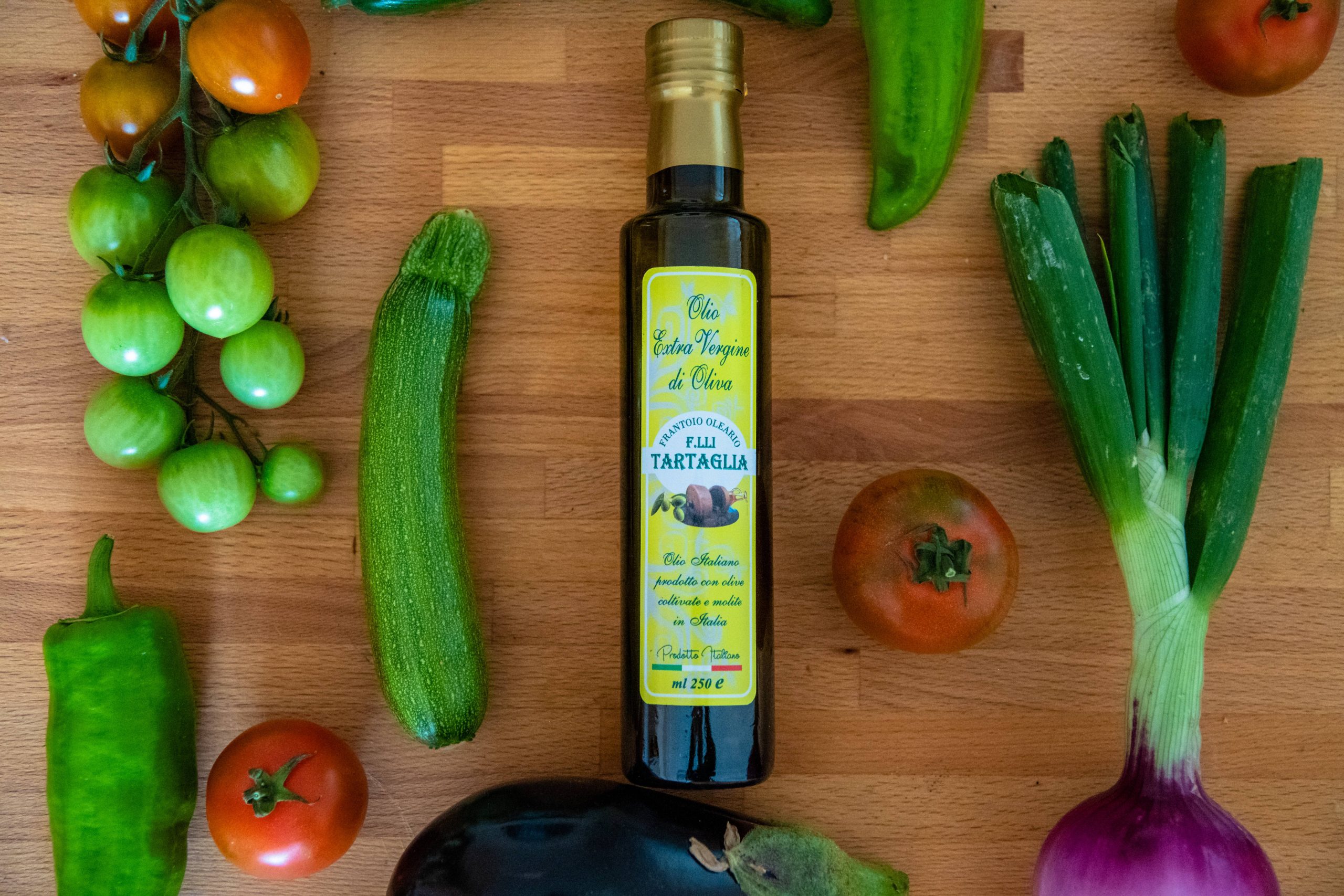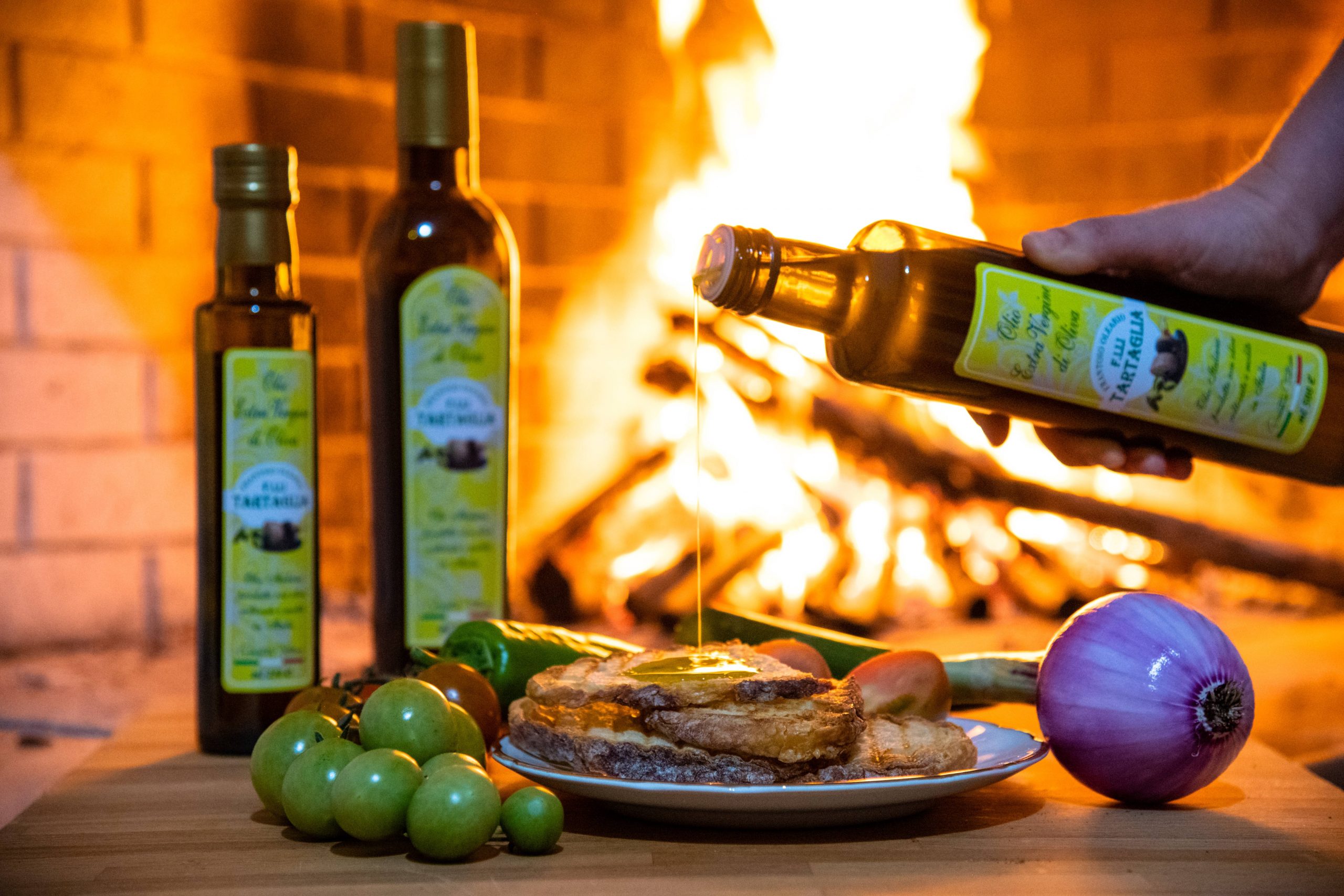FAQ
As previously mentioned, extra virgin olive oil is produced from olives processed exclusively by mechanical processes. The conditions under which the olives are processed to produce an “extra virgin” grade must be kept constant so that the acidity, expressed in oleic acid, is not higher than 0.8 ph.
In order for the extra virgin olive oil to be considered a good quality oil it must have at first impact an herbaceous or fruity scent, which refers to the plant, and leaves a slightly bitter and spicy flavor in the mouth, irremovable characteristics of the fruit from which it comes. The taste of an extra virgin olive oil must be as close to the essence of its fruit as possible, because it is the real “juice” of olives.
Chemically the bitterness and the spiciness in the oil are given by the presence of substances called polyphenols, the ‘natural antioxidants’. The loss of polyphenols occurs when the product is exposed to oxygen, light and high temperature. When the oil is in the fruit, still attached to the plant, under the right conditions and at the right degree of ripeness, it is completely isolated from these three factors; however, as soon as we go to extract it from the fruit, it will be subjected to the processes of decomposition.
As for the oxygen and consequently the oxidation of the product, the oil, thanks to the phenols, is able to defend itself in a natural way; attention, however, because phenols are substances that once in contact with oxygen, it loses their protective action within a certain time, leaving the oil without any natural defense. It is the consumer’s responsibility, therefore, to preserve it in the best way possible. It is the consumer’s responsibility, therefore, to preserve it in the best way possible. We can of course store Extra Virgin Olive Oil in closed containers such as dark glass bottles or stainless-steel containers, keeping it as less as possible in contact with air and other smells because the Oil is able to capture and absorb any type of smell and taste surrounding it. Also, keep it away from direct light and conserv it in an ideal temperature (between 8°C and 14°C).
Extra virgin olive oil is a vegetable fat with high nutritional value, we can call it a ‘nutraceutical’ product, because it is very nutritious and has positive attributes for your health. We can consider Extra Virgin Olive Oil a real cure-all for health, it is rich in natural antioxidants which has positive effects on the entire cardiovascular system. In fact, the oil intervenes by decreasing the level of total cholesterol and simultaneously raising the level of HDL cholesterol, the “good” cholesterol, which can eliminate the accumulated bad cholesterol in your arteries. We conclude saying that it is one of the healthiest and most genuine food that our organism can assimilate.
One of the ‘secrets to good frying’ is definitely in the oil. It is obvious that the perfect attributes to a good fry is the right way of cooking, which means an external crunchiness and an internal softness. In addition, it should not be too oily. Let’s see how extra virgin olive oil can affect all of this.
The crispiness of fried foods is the crystallization of the starch that covers the food (e.g., flour or batter). The crystallization generates a real crispy shell on the outside that does not allow the oil to enter, not moistening the food and does not allow water vapors to be released as well ensuring internal softness.
To ensure this the process of crystallization, it is necessary to bring the oil to the perfect high temperature. In fact, the higher the temperature of the oil, the faster the crystallization will take place. Thanks to its smoking point, the extra virgin olive oil comes into play (the smoking point is the maximum temperature limit that can be reached before it releases free radicals, harmful to the organism). Therefore, the smoking point changes from oil to oil and that extra virgin olive oil is among the highest in the world, about 150°C, which means that the extra virgin olive oil is absolutely the best oil suitable for frying any type of food.
The so-called EVO Oil is nothing more than Extra Virgin Olive Oil. The acronym EVO has been attributed in order to be easily distinguished from other non-extra virgin olive oils (also made from olives). The many differences between the two oils are the following EVO or extra virgin olive oil is obtained from healthy olives and is processed exclusively by mechanical methods. It is obtained from olives harvested and processed in a short period of time that does not undergo any treatment. On the other hand, simple Olive Oil is a mixture of olive oil combined with other refined oils. In addition, this particular oil is also chemically treated and unhealthy.
Many still think that extra virgin olive oil is the result of who knows which particular process. For this reason, it is important to understand that the oil obtained from olives, but Extra Virgin Olive Oil, is a food product that is born exclusively in the mill mill from the pressing of the olives by mechanical processes, without using any chemical intervention. As a confirmation of everything, on the label of an extra virgin olive oil you will find the following words “superior category olive oil obtained directly from olives and only by mechanical processes” which represents precisely the simplicity of the extraction process in the mill.
Many still think that extra virgin olive oil is the result of who knows which particular process. The temperature of the pasta when the extra virgin olive oil is extracted must not exceed 27 ° C. Very often we speak of “first cold pressing”, suggesting that there is a second pressing phase. In reality this wording refers to a past technique, no longer used, which consisted in crushing the olives twice with hydraulic presses as, with a single squeezing it was not possible to obtain all the product.
Cold pressing allows the nutritional and physical characteristics of extra virgin olive oil to be kept unaltered, preserving its properties intact and enhancing the benefits that derive from it once consumed. The Frantoio Oleario also known as Oleificio is the place where extra virgin olive oil is obtained from the processing of olives using only mechanical means that do not in any way alter the product.
Depending on the type of processing it can be defined: continuous cycle; or a traditional or press crusher).
The continuous cycle crusher was born from the need to obtain an ever higher quality of extra virgin olive oil, combining technology and innovation. It is defined as a continuous cycle as there is no need for human intervention between the various stages of extraction; a succession of steps takes place between the various machines that I compose in the extraction cycle of the mill.
The olives are washed and defoliated, subsequently sent to the crusher or, depending on the processing system, to the stone millstones, which work them until the dough is obtained; this is left to knead and sent to the Decanter, which separates it into its three components, pomace, vegetation water and oil. The oil and water are in turn sent to the separators which provide us with the finished product free of impurities.
The advantages of a continuous cycle crusher are:
– All the processing and transformation phases of the olives take place in a continuous cycle, consequently product transformation times are reduced.
– The cleaning of the machinery, with the possibility of a programmable washing, avoids impurities in the product, resulting in a better quality oil.
Disadvantages:
– High cost of machinery
The Press Mill also defined as a traditional or discontinuous system, because between the various extraction phases it is necessary the intervention of the operator (e.g., stacking the fiscoli, moving the trolleys in the pressing phase).
The olives are washed and defoliated, and then crushed; the paste obtained through dosing machines is distributed on fiber discs (now synthetic, once vegetable fiber) called fiscoli, which are placed one on top of the other in stack on a trolley; this is then taken to the press to obtain oil with a real mechanical pressing.
The advantages of a traditional crusher are:
– Low cost of machinery.
– Minimum electricity consumption.
Disadvantages of traditional crusher:
– Longer processing times.
– Throughout the processing process, the long exposure time of the pulp to air occurs, leading to oxidation and the onset of decomposition of polyphenols, resulting in increased acidity and peroxides.
It is good to specify that it is recommended to consume an Extra Virgin within 18 months from the date of production.
Beyond the storage period the oil can still be consumed in complete safety, without any damage to the health of the consumer. All this obviously implies a good conservation of the product by the consumer himself.
This is because, a distinction must be made between expiration and minimum conservation term.
In fact, a product that expires, since it is perishable, must be consumed no later than the precise expiry date shown on the label (DD / MM / YY) to safeguard the health of the consumer.
The Extra Virgin Olive Oil, on the other hand, does not expire, but the label will bear the words “ TO BE CONSUMED PREFERABLY WITHIN ” only with month and year (MM / YY) since it will not involve a risk for the health of the consumer to use it beyond term.
It could simply happen that, beyond this term, the organoleptic characteristics of the product decay, and consequently those typical bitter and spicy hints fade.



